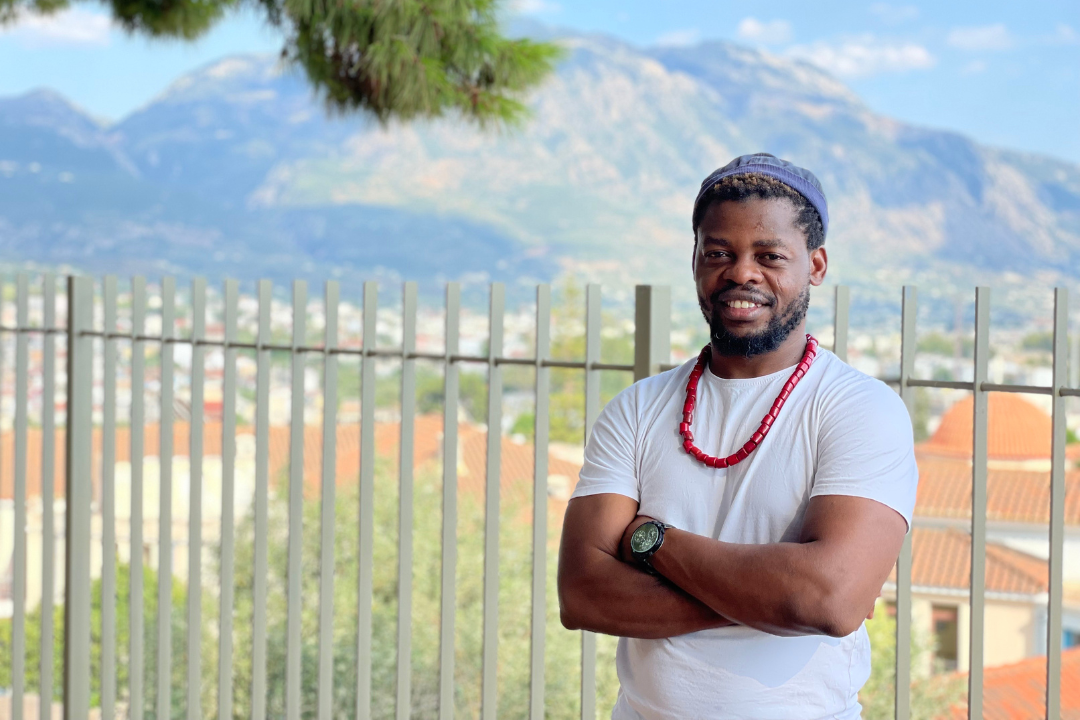It seems dance artists are onto something with the arrival of the metaverse. After all, the creative economy is arguably the most crucial component of this virtual world. But how can it also be utilised to protect dancers and their work?
Qudus Onikeku, co-founder and artistic director of the QDance Center in Lagos and YK Projects in Paris, and research fellow on dance and AI at the University of Florida, writes for Dance Umbrella about how AI can be used to build a “data bank” of dance moves in the metaverse – taking the dance ownership conversation away from copyright law and towards data rights.

Qudus Onikeku, credit Alli Hajarat
It seems dance artists are onto something with the arrival of the metaverse. After all, the creative economy is arguably the most crucial component of this virtual world. Without artists, the virtual worlds would be bleak and bland banks of incomprehensible data.
What, then, are the opportunities for dancers in the metaverse, where the rules of the material world do not hold?
As a dancer, choreographer and research professor at the University of Florida’s College of the Arts, my current work focuses on the intersection of dance and AI. It is titled Atunda: AI-driven software for annotating dance moves across cultures. Its ultimate purpose is to build a dance data bank for deep learning, and use the intelligence generated from the data to protect intellectual property for future dance makers.
Collaborating with researchers, scientists and dance communities, we are deliberately considering the notion of wealth redistribution, and asking two very pressing questions about the possibility of wealth pre-distribution.
What if there is an internet of things, based on a truly shared economy, which uses AI to analyse dance moves, and blockchain to keep time stamped records, in order to get the assets dancers create back under their own control?
What if there is a data union of dancers globally, collectively ensuring every dance creator in the metaverse is properly remunerated for their labour, data and creative output?
Legal implications
When we say “dance moves”, we are not referring to ordinary motor activities, gestures, commonplace movements or dance steps that have no belonging nor proper identifiability.
We are making a case for the myriad of signature moves that enter the category of viral dance trends, both in history and in the future. We define a dance move as a unit of groove or symbolic movement that can be repeated in a loop, and forms the base or a variation of an existing dance style that can be further developed through improvisation.
This is where biases in copyright law come in. Dance is copyrightable, but only when memorialised in a tangible form: that is notated or codified in written form. Dance moves, therefore, are not considered a creative body of work – and thus not copyrightable.
This prompts troubling questions. If a dance move goes viral, who owns it? As artists put these snippets of their dance creations into the digital universe, who can lay claim to them in the future?
Fortnite, the ultra-successful video game which has generated billions of dollars in revenue, is a case in point. Its developer, Epic Games, has faced numerous lawsuits from dance artists who claimed their dance moves were lifted for “emotes”, which are in-game animations of viral dance moves. Previous lawsuits have been dismissed due to ambiguity in the law. And while Epic has started to credit creators, it has continued to face further lawsuits from those who claim their work was taken without permission or payment.
This effectively constitutes the divorcing of dance moves from their original context, and erasure of an artist’s work. So yesterday’s solutions – unethical tech and archaic copyright laws – are now today’s problems.
Technology brings great wealth but not necessarily shared prosperity. It is a perpetuation of the pattern of appropriation, where returns from creative output slip away from those with less, the very people who spark viral brilliance from nothing, to those with so much more.
Dance data
For Atunda as a digital concept, when we say “dance data” we mean data which represent connected dances, and gathering information about their properties through cameras or sensors; data that are shared from physical bodies, within a given space, with other bodies over the internet. Any dance move that is captured digitally and linked over public or private neural networks becomes part of the metaverse.
We are saying that such data should be legally traceable to its original owner.
The ethics of intellectual property have been broken by the internet of virality. So, since technology is not neutral, the law is not helpful, existing algorithms are manipulative and protocols are not inclusive, it is up to us as dancers to encode the kind of future we want.
That is what we are building towards with Atunda’s data bank: a digital repository where dance moves are captured, memorialised in tangible form and governed through smart contracts.
With the AI-driven movement recognition and classification technique we are developing, we will be able to analyse dance moves to produce intelligence. We are taking the dance ownership conversation away from copyright law to data rights: turning dance into data, data into codes, codes into intellectual property and intellectual property into currency.
Our solution is pushing the limit of knowledge in the AI field. Going forward, we are speculating dance can actually teach AI to learn better, and in turn task it to protect motion-based intellectual property in much the same way Shazam is able to recognise music playing in the background.
The protocols we are developing through this research could have a parallel impact on the use of dance, and recognise unauthorised use and publication of dance moves in the likes of video games, NFTs and whatever else is coming next.
Democratising technology
Certain artists have raised concerns about Atunda and potentially negative implications for dance practice and creativity. It is a legitimate concern, and something we are taking very seriously. But all we are doing is using available tools to examine why dancers are always at the bottom of the value chain of the creative economy.
Our interest with Atunda is to democratise technology by putting it in the hands of those who need it in order to arm themselves against abuse. Atunda is deliberately drawing on Africanist epistemologies and cultural practices to strengthen the technical infrastructure of the global dance community to fully participate in the digital revolution on our own terms.
In doing so, we are attempting to undo the increasing inequalities already embedded in the development of AI technologies. Where some countries or disciplines lead, appropriate and dominate, others have absolutely no stake, nor a real chance in joining the current AI race.
In other words, the metaverse is already a colonised space, and as much as I am all for fair use, borrowing and taking inspiration from existing works in dance, I am equally very much aware of the history of appropriation and creative theft, to which Africa and Africans have been the greatest sufferers.
It is, therefore, paramount that everyone has the knowledge, content and data they generate in the metaverse under their own control, because our current social currency and relational economy favours stealing and appropriation over fair use or wealth redistribution.
Data union for dance makers
A data union is an existing Web3 framework for building applications that pay users for crowd-sourcing and crowd-selling solutions, which enables people to earn by sharing valuable data, and liberate it from centralised monopolies.
Atunda’s sole purpose is to collect human motion data in a fully transparent, fair and configurable way. We thought the most ethical way to achieve this is to explore the data union model for the global dance community by incentivizing the collection of datasets for the purpose of AI training.
The option we are considering is to build a pipeline that provides a framework for dancers and dance makers to upload their original or reused data by choosing from an array of privacy settings, like in the creative commons system.
On its own, these uploaded data do not hold much value, other than it being evidence of ownership in times of dispute. But when combined in a data union, it can then aggregate into an attractive marketplace for buyers to extract insights. It could be part of a motion library for gamers and animation film makers, or it could be minted as NFTs or for other commercial purposes such as adverts.
Dance has been primarily deprived of these developmental possibilities. We simply want dancers to be able to repossess their bodies – and own what those bodies produce.
Edited by James Cheng-Morris
About Qudus Onikeku +
Qudus was born and grew up in Surulere district of Lagos, Nigeria. Very quickly he had the urge to express something of himself, and it was at the age of 5 that he began to discover his acrobatic prowess. Through his love of acrobatics, he discovered dance at 13. In 2009, Qudus graduated from the École nationale supérieure des arts du cirque in France. With a special interest in Acro-Dance, since then he has managed to create a movement identity that fuses dance and acrobatics, while making his Yoruba traditional philosophy his basis, combining it with several other influences such as hip hop, capoeira, tai chi and contemporary dance vocabularies, to weave a certain understanding of dance, art, politics and everything in between.
For more than a decade, he has retained a presence in the Nigerian choreographic scene, and became part of the new generation of creators springing from Africa. Qudus is well known in Europe, the USA, Latin America, Asia and the Caribbean for his solo works, writings and public space happenings. He has also danced, collaborated and toured widely with renowned artists all over the world.
